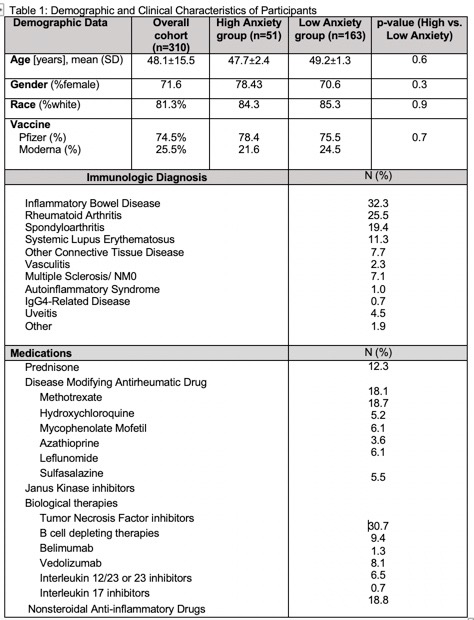Session Information
Date: Tuesday, November 9, 2021
Title: Patient Outcomes, Preferences, & Attitudes Poster IV: COVID-19 (1589–1613)
Session Type: Poster Session D
Session Time: 8:30AM-10:30AM
Background/Purpose: As the COVID-19 pandemic unfolded, people across the world experienced a psychological burden with social confinement, concerns about health, potential infection, jobs, financial difficulty, and uncertainty about the future. Immunosuppressed patients with chronic inflammatory diseases (CID) may have experienced an additional burden with their immunocompromised status. The purpose of this study was to examine patient-reported outcomes over time in patients with CID undergoing SARS-CoV2 vaccination.
Methods: This is a prospective cohort of patients at two sites with CID undergoing SARS-CoV2 vaccination. Participants completed 3 study visits (baseline before vaccination (T1), after dose 1 (T2), and after dose 2 (T3)) where blood and clinical data were collected. Patient-reported outcomes were measured with the PROMIS-29, which includes 4-item scales for 7 domains (physical function, fatigue, anxiety, depression, sleep disturbance, social participation, pain interference) and a 1-item pain severity question. PROMIS-29 scales were summed and converted to T scores (population mean [SD] of 50 [10]). Mixed effects models were used to examine how the PROMIS scores compared to baseline after both vaccination doses, adjusting for age, gender and study site.
Results: The cohort was 72% female with a mean (± SD) age of 48.1±15.5 years (Table 1). In the overall cohort, sleep disturbance significantly improved after both doses of SARS-CoV2 vaccinations (T score -2.5, 95%CI -3.4, -1.6) (Tables 2). Anxiety improved after the second vaccine dose. Improvements in each were within the range of estimated minimally important differences (MID). Physical function worsened, although this did not meet the MID threshold (-1.0, 95% CI -1.6, -0.4). In an analysis stratified by levels of baseline anxiety (High anxiety: PROMIS Anxiety ≥55 vs < 55), improvement in anxiety at T3 was greater for the higher versus lower anxiety group (-5.4, 95% CI -7.2, -3.6 [T3 T1] vs. -3.7, 95%CI -5.6, -1.8). Improvements in fatigue (-2.1, 95% CI -3.6, -0.5) and social participation (2.3, 95% CI 0.5, 4.2) were also noted for the high-anxiety group (Table 2). Similar to the overall cohort, physical function worsened slightly for both groups and sleep disturbance improved significantly.
Conclusion: With the completion of the SARS-CoV2 vaccine series, sleep disturbance decreased in a significant and meaningful way in patients with CID. In patients with higher anxiety at baseline, not only did anxiety decrease, but so did fatigue and sleep disturbance in addition to an increase in social participation. Overall, this suggests vaccines may lead to improvements in mental health and wellbeing of patients with CID, particularly among those with greater anxiety.
 Adjusted for age, gender and study site
Adjusted for age, gender and study site
To cite this abstract in AMA style:
Pawar N, E. Taylor K, Yang M, Deepak P, Kim W, Paley M, Matloubian M, Carividi A, Ciorba M, Demissie E, El-Qunni, A, Huang K, Kinnett B, McMorrow L, Paez D, Rose A, Schriefer R, Ellebedy A, Kim A, Nakamura M, Katz P, Gensler L. Sleep Disturbance Improves with SARS-COV2 Vaccinations in Patients with Rheumatologic and Chronic Inflammatory Diseases [abstract]. Arthritis Rheumatol. 2021; 73 (suppl 9). https://acrabstracts.org/abstract/sleep-disturbance-improves-with-sars-cov2-vaccinations-in-patients-with-rheumatologic-and-chronic-inflammatory-diseases/. Accessed .« Back to ACR Convergence 2021
ACR Meeting Abstracts - https://acrabstracts.org/abstract/sleep-disturbance-improves-with-sars-cov2-vaccinations-in-patients-with-rheumatologic-and-chronic-inflammatory-diseases/

